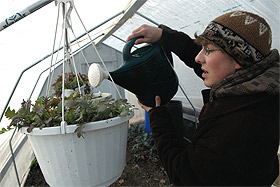News Archives - 2008
Grub that's good for you and the environment
 It will be a meal planned with the environment in mind.
It will be a meal planned with the environment in mind.
This semester, students in SBS 100: Environmental Connections have studied how food fits into both our socio-economic and ecological systems. This Wednesday, they will put that knowledge into action as the class members will serve a meal that they helped the A'viands staff prepare. The entire Augsburg community is invited to share this "grub" with the class. The menu was chosen based on how the food was produced and transported.
Some of the ingredients were grown on campus. Almost all of the items were produced locally. Special consideration was placed on supporting suppliers that use environmentally friendly practices and pay employees a fair wage.
The meal--which is part of the final exam for the students--is meant to inform members of the Augsburg community about the environmental and social impact of the food we eat.
The course syllabus spells out rather simply the goals of the class: This year our focus is on food--what we eat, where it comes from, and the effects of food production and consumption on bodily, community, and planetary health.
To reach that point, students in Environmental Connections, the introductory course to Augsburg's new environmental studies major, have learned about the history, economics, sociology, math, and science behind food and food production. They planted seeds in Augsburg's greenhouse and are harvesting the fruits of their labors on Tuesday night and Wednesday morning prior to the lunch. The class also visited local farmers markets and co-ops.
Richmond Appleton, a senior environmental studies major and Peter Klink [pictured left], a first-year studying marketing and environmental studies, said the class has been enlightening. "Most of the food we eat has a huge impact on the environment, like just one cup of coffee," Appleton said. The class visited the Peace Coffee Company in Minneapolis to learn about the impact of coffee and the company's efforts to promote sustainability and fair/free trade. Peace Coffee delivers all coffee within 20 miles of its South Minneapolis location by bike and delivers the remainder in a van powered by biodiesel. All employees receive a fair wage and are able to travel to the countries where their coffee is grown and produced in order to learn firsthand about its production.
Appleton and Klink also said the class was surprised to learn that more than 60 percent of the carbon found in our hair comes from corn. This is due to the preponderance of corn additives, particularly the ubiquitous high fructose corn syrup, found in our food. (http://asap.sustainability.uiuc.edu/)
The class, which is being co-taught by Michael Lansing (history) and Joe Underhill (political science), has featured guest lectures from professors across campus. For example, John Zobitz, an assistant professor of mathematics, talked about the carbon cost of food. "Determining 'how far' food travels from farm to plate is a challenge to quantify because of the many different ways food can be transported and processed," Zobitz said.
Prior to Zobitz' lecture, students analyzed their diet for a week and determined what proportion came from particular food groups. They then calculated the average distance their food traveled based on a recent published study. Students also determined the carbon footprint (or total emissions) for their food choices and discussed how different diet choices affect the emissions output of food and how to quantify a local diet.
The course also focused on food justice issues such as "food deserts" and out-of-balance food environments. In neighborhoods without grocery stores where most readily available food comes from fast food restaurants and convenience stores, residents are unable to make healthy choices. One study conducted by the Mari Galagher Research & Consulting Group in Chicago found that in these areas residents are more likely to die prematurely and at greater rates from diabetes, cancer, and cardiovascular diseases and to suffer from obesity and hypertension.
Students have also spent a lot of time in class talking about changing habits. "Changing what you eat is hard when you are a student," Klink said. "We've struggled with how to do that," Klink said, "because making one change hurts others. For example, if we all quit eating meat, people in the meat industry lose jobs."
Wednesday's menu (some items subject to change)
- Radish soup
- Mesclun salad with local greens & spinach
- Free range chicken
- Walleye chowder
- Shepherd's pie with winter vegetables (kale, beets, chard, winter squash)
- Pumpkin ice cream from Izzy's and Kemps
- Caramel apple crumble pie
- Apple cider (hot and cold) from Nesbitt's Orchard